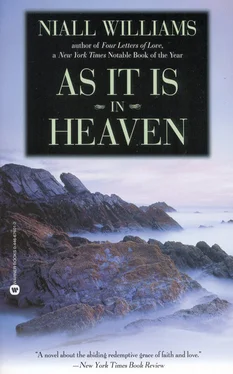It was during those evenings while minding Alannah that he first brought the chess set there. While the baby slept he sat in a corner of the room and played against himself. Within two weeks he had a few regular opponents, the waiting parents of the children, and the chess and music became so entwined during that winter that sometimes Stephen stopped in mid-game and felt the spirit of Philip Griffin beside him.
Soon it was clear it was to be a wretched winter. The sea grew high and wild and angry. Morning evening and night the wind howled, until at last it was impossible to imagine a place far out in the Atlantic that was before the beginning of the wind. The new slates that Corry & Son & Nephew had put on came off and shattered on the road outside. The air was full of salt. Faces dried and cracked, and a general rheuminess ran through all the parishes of the western seaboard. In the garden that faced the sea the plants burned, and Stephen watched them from the kitchen window with a sudden chill in his heart. In the fierce winds of All Souls' Night whole shrubs were lifted out of the ground and tossed into Clancy's down the road. To Stephen it felt like a portent. For three days he went outside in the gusting sea-winds and tried to secure the plants that remained. He dressed them in sacking and staked them and bound them with yellow baler twine, until they resembled weird effigies of the plants they had been in summer.
Despite the harshness of the season the music school prospered. Adults came for classes in the wild driven rain of the mornings, and sat on in the small coffee shop Moira ran, where they listened to music they had never heard before and which nourished them in their spirits and helped them endure the terrible vicissitudes of grief and loss that are the inheritance of all.
Gabriella was happy. She almost did not dare to admit it. When she held Alannah in her arms she felt the wonder of the child and wept often, alarming Stephen into offering all kinds of remedies, which she turned down, telling him he was such a great fool he did not know sorrow from joy. “This,” she said, with lemon-scented tears flowing down her cheekbones, “is joy.”
“Oh, right,” he said, and stood there, hopeless and inadequate to understand what was flowing between the mother and the child.
And so, even in the battering and scouring of that winter, a kind of healing occurred for Stephen and Gabriella. It was the kind that comes when people are living side by side in a small house in a beautiful and desolate place, where little by little the past vanishes and the present moment seems large enough to contain a whole life. It was the kind of healing that is made of endless cups of tea, of changing nappies, of music playing, of books picked up and put down after three pages, of short naps and long dreams, and of the deeply comfortable silences that grow between a man and a woman who come to know each other so utterly that they breathe each other's breath and do not need many words. And in that winter, Stephen and Gabriella grew together, while the leafless plants in the garden were bound and motionless outside. They knew each other's rhythms like clocks in a jeweller's shop that chime at staggered midnights. Stephen began to learn Italian and walked through the cottage, at first saying phrases from Frasi Utili e Idiomi, and then progressing to short passages learned from Dante's Purgatorio and II Paradiso, which had the double bonus of astonishing Alannah and making Gabriella laugh.
Gabriella knew how she could tease Stephen. She still loved to measure the sincerity of his feelings with countless tiny tests, requesting that he change his habit of leaving the tea caddy open, leave down the toilet seat, allow the bedroom window to be left open all night even in the fierce winds of November let the cats sleep in the kitchen, wash his feet before bed. To all Stephen complied without hesitation. He saw them as a myriad of proofs of his own loving, and then recognized that each time Gabriella asked him something it was also to tell him that she was preparing to live with him forever.
At no time did Stephen ask Gabriella again to marry him. Sometimes, in a fit of gloom, Gabriella would feel the absence of space between them, the claustrophobia that weighs on lovers until they redefine each other's strangeness. Then she would look up from a book and think to throw it at him, to hit out at the suddenly infuriating omnipresence of his affection. She would make a demand: Did he not notice how the cooker was broken? how the gas kept shutting off and had to be fiddled to get right?
“Do you not notice things like that?”
“I will look at it now.”
“No, it's too late. I don't mean you to do it now. It's just you don't …”
She would shake her head at herself and sit in the heavy silence, wondering why she felt the need to strike out at him. He had the dissatisfying reality of saints. He knew nothing of the real world. He would not know the names of three politicians, how to fill tax forms or fix the plumbing. But then, just as suddenly, the gloom would relent and she would look at him and be astonished that she was living with such an extraordinary man.
Then, on the last evening of that November, they returned home from the school and found a letter from Nelly Grant waiting. It was written in a rounded looping hand and told her own adventure, how she had shut the shop and left Kenmare two weeks after them to follow her imagination to Italy; how she has spent six months there, arriving in Venice in the rain and travelling the Adriatic coastline to Ravenna and Rimini, where she had stayed, eating a diet of every kind of shellfish, until she said her dreams took on the warm and salty quality of that sea and left her experiencing the softness of life that we forget in building our shells. She had learned new cures, and discovered her age was imaginary, for when she returned to Kenmare she felt the bigness of the mountains like a child.
Stephen and Gabriella read the letter in turns, while the wind blew rain and sea foam against the windows and Alannah slept. And when Stephen was reading it Gabriella looked at him and saw the gladness moving across his face. The light from the tasselled lamp was beautiful upon him, and she understood with the sudden clarity of enlightenment that shows us the shape of the world. And it was his stillness and peace that she felt, the loving that was deeper and wider than she could encompass. And she whispered: “Stefano.”
He was startled and looked up quickly from the page.
“You know I love you,” she said.
He said nothing. The wind blew outside, the child slept.
“No matter how impossible I am.”
The letter quivered in his hand.
“No matter what I say, I do,” Gabriella said. “Please don't ever leave me.”
He had slipped across to her from his armchair and was crouched low beside her. Her hand touched his face.
“I won't,” he said. “I couldn't live. I love the impossible.”
 They made love that night beneath the million drops of the rain running on the skylights above them like tears. They undressed each other by the turf fire, where the slowness of their movements was like the movements in a dance. There was no music playing, only the water falling out of the sky into the sea and the sea's slow churning in the ordinariness of time. With the small hollows of the palms of his hands Stephen pressed upon the warm skin of Gabriella and travelled the places of her body backward and forward in the endless sojourn of loving that finds no limit in the other's body but returns across the places caressed as if they were a New World discovered, warmed and scented like the tropics. They entwined each other, the small woman and the long man, sitting on the floor before the fire, where Gabriella held back her head so that he might kiss her neck and her breasts and so that she could hold his head against her in the dream of their being one.
They made love that night beneath the million drops of the rain running on the skylights above them like tears. They undressed each other by the turf fire, where the slowness of their movements was like the movements in a dance. There was no music playing, only the water falling out of the sky into the sea and the sea's slow churning in the ordinariness of time. With the small hollows of the palms of his hands Stephen pressed upon the warm skin of Gabriella and travelled the places of her body backward and forward in the endless sojourn of loving that finds no limit in the other's body but returns across the places caressed as if they were a New World discovered, warmed and scented like the tropics. They entwined each other, the small woman and the long man, sitting on the floor before the fire, where Gabriella held back her head so that he might kiss her neck and her breasts and so that she could hold his head against her in the dream of their being one.
Читать дальше

 They made love that night beneath the million drops of the rain running on the skylights above them like tears. They undressed each other by the turf fire, where the slowness of their movements was like the movements in a dance. There was no music playing, only the water falling out of the sky into the sea and the sea's slow churning in the ordinariness of time. With the small hollows of the palms of his hands Stephen pressed upon the warm skin of Gabriella and travelled the places of her body backward and forward in the endless sojourn of loving that finds no limit in the other's body but returns across the places caressed as if they were a New World discovered, warmed and scented like the tropics. They entwined each other, the small woman and the long man, sitting on the floor before the fire, where Gabriella held back her head so that he might kiss her neck and her breasts and so that she could hold his head against her in the dream of their being one.
They made love that night beneath the million drops of the rain running on the skylights above them like tears. They undressed each other by the turf fire, where the slowness of their movements was like the movements in a dance. There was no music playing, only the water falling out of the sky into the sea and the sea's slow churning in the ordinariness of time. With the small hollows of the palms of his hands Stephen pressed upon the warm skin of Gabriella and travelled the places of her body backward and forward in the endless sojourn of loving that finds no limit in the other's body but returns across the places caressed as if they were a New World discovered, warmed and scented like the tropics. They entwined each other, the small woman and the long man, sitting on the floor before the fire, where Gabriella held back her head so that he might kiss her neck and her breasts and so that she could hold his head against her in the dream of their being one.









